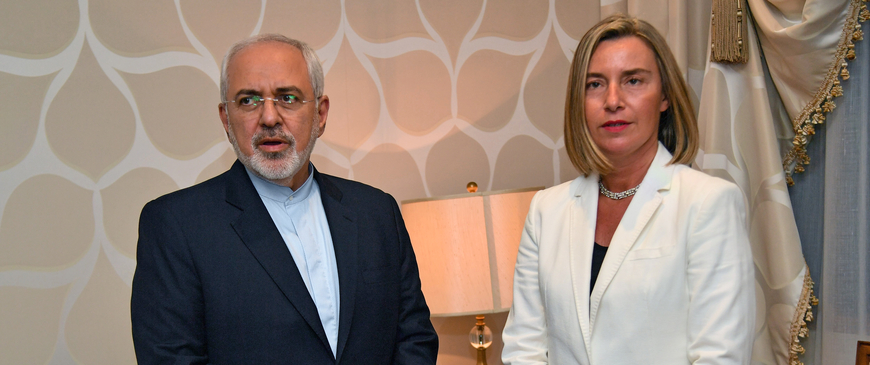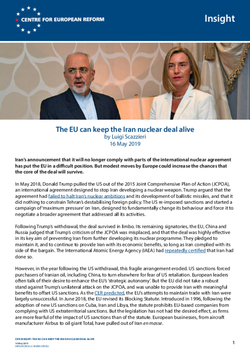
The EU can keep the Iran nuclear deal alive
Iran’s announcement that it will no longer comply with parts of the international nuclear agreement has put the EU in a difficult position. But modest moves by Europe could increase the chances that the core of the deal will survive.
In May 2018, Donald Trump pulled the US out of the 2015 Joint Comprehensive Plan of Action (JCPOA), an international agreement designed to stop Iran developing a nuclear weapon. Trump argued that the agreement had failed to halt Iran’s nuclear ambitions and its development of ballistic missiles, and that it did nothing to constrain Tehran’s destabilising foreign policy. The US re-imposed sanctions and started a campaign of ‘maximum pressure’ on Iran, designed to fundamentally change its behaviour and force it to negotiate a broader agreement that addressed all its activities.
European leaders often talk of their desire to enhance the EU’s ‘strategic autonomy’. But the EU did not take a robust stand against Trump’s unilateral attack on the JCPOA.
Following Trump’s withdrawal, the deal survived in limbo. Its remaining signatories, the EU, China and Russia judged that Trump’s criticism of the JCPOA was misplaced, and that the deal was highly effective in its key aim of preventing Iran from further developing its nuclear programme. They pledged to maintain it, and to continue to provide Iran with its economic benefits, so long as Iran complied with its side of the bargain. The International Atomic Energy Agency (IAEA) had repeatedly certified that Iran had done so.
However, in the year following the US withdrawal, this fragile arrangement eroded. US sanctions forced purchasers of Iranian oil, including China, to turn elsewhere for fear of US retaliation. European leaders often talk of their desire to enhance the EU’s ‘strategic autonomy’. But the EU did not take a robust stand against Trump’s unilateral attack on the JCPOA, and was unable to provide Iran with meaningful benefits to offset US sanctions. As the CER predicted, the EU’s attempts to maintain trade with Iran were largely unsuccessful. In June 2018, the EU revised its Blocking Statute. Introduced in 1996, following the adoption of new US sanctions on Cuba, Iran and Libya, the statute prohibits EU-based companies from complying with US extraterritorial sanctions. But the legislation has not had the desired effect, as firms are more fearful of the impact of US sanctions than of the statute. European businesses, from aircraft manufacturer Airbus to oil giant Total, have pulled out of Iran en masse.
The EU also encouraged the European Investment Bank to step up lending to Iran. But to do that it would need to access international capital markets to raise funds, which meant it too would fall foul of US sanctions. In January 2019, France, Germany and the UK set up INSTEX, a special purpose banking mechanism that aimed to enable European firms to do business with Iran. However, to function, Iran needs to fulfil anti-money laundering and anti-terrorism financing standards – which it has not yet done. Moreover, INSTEX would not, at least initially, cover oil sales.
Iran’s economy has contracted significantly since the US pulled out: gross domestic product shrank by almost 4 per cent in 2018 and the IMF predicts it will shrink by another 6 per cent this year, with inflation reaching 50 per cent. Iranian oil exports have plunged from 2.8 million barrels per day in April 2018, just before Trump announced his intention to withdraw from the JCPOA, to around 1.1 million barrels a day in April 2019. Full compliance with the deal has looked increasingly pointless to the Iranians, who have stuck to their side of the bargain, but not received sanctions relief in return.
The US announcement in April that it would not renew sanctions waivers probably pushed Tehran over the edge. These waivers allowed some countries to continue importing limited quantities of Iranian oil. On May 8th, Iranian President Hassan Rouhani announced that Iran would no longer fully comply with the JCPOA’s provisions. In the immediate term, Iran will no longer abide by the agreement’s limits on low enriched uranium and heavy water, building up its stockpiles. In reality, this is a limited step, especially considering that the US has recently re-introduced sanctions that make it difficult for Iran to export these materials to third countries as it has done until now, and that Iran did not announce it was increasing production. Rouhani stressed that the move was not designed to undermine the agreement, and indeed the move per se does not, as long as Iran does not exceed the thresholds set by the deal.
However, Rouhani also issued an ultimatum, stating that Iran would resume other nuclear activities within 60 days unless the deal’s signatories did more to mitigate the effects of US sanctions on banking and oil exports. In response, the EU said it rejected the ultimatum, but remained fully committed to the deal. It called on Tehran to continue to abide by its obligations, and said it was determined to allow legitimate trade with Iran to continue. China stated that the agreement should be ‘fully implemented’. For its part, Russia blamed the US for the escalation, and called on Europeans to do more to uphold the deal.
The EU, China and Russia will await the report of the IAEA in August to assess Iranian compliance with the agreement and decide on the next steps.
The EU, China and Russia will await the report of the IAEA in August to assess Iranian compliance with the agreement and decide on the next steps. The situation is highly risky. Tensions between the US and Iran have increased rapidly in the past weeks. In April, the US designated the Iranian Revolutionary Guard as a terrorist organisation, and Iran retaliated by doing the same for all US troops in the Middle East. Citing fears of Iranian attacks on US troops in the region, the US has stepped up plans to increase troop deployments near Iran.
Iran’s announced withdrawal from the JCPOA increases the risk of conflict with the US. Trump is a long-standing sceptic of US involvement in the Middle East, and has scaled back the number of US troops in Syria. He wants talks with Iran to persuade it to sign up to an improved deal. However, Iran hawks in his administration such as National Security Advisor John Bolton and Secretary of State Mike Pompeo want to weaken the regime and will be pleased to have an opportunity to increase pressure on Iran. While neither the US nor Iran seek open conflict, they could stumble into it. Both sides might miscalculate where the other’s red lines lie, and a minor confrontation between Iranian proxies and US allies in the region could quickly draw in the US and escalate.
The EU finds itself in a very difficult position. Europeans judge that US pressure on Iran has already increased the chances of accidental conflict. Failing to provide Iran with meaningful sanctions relief will increase the chances that it will resume its nuclear programme, further raising the risk of a military confrontation. However, re-establishing trade links with Iran, as Rouhani has demanded, would risk a head-on clash with the US. The Trump administration has made clear that it will oppose any attempt to keep the JCPOA alive, and it is likely the US would retaliate through sanctions and tariffs on European goods. In the face of such US pressure, there is a high chance that European unity would fracture. Additionally, the EU’s calculations are complicated by the fact that several member-states share Washington’s concerns about Iran’s destabilising foreign policy, such as its support for Hezbollah in Lebanon and the Houthis in Yemen, and its testing of ballistic missiles. There is also anger about the assassination of Iranian political opponents in Europe. The EU has imposed sanctions on Iranian officials allegedly involved. Rouhani’s decision to deliver his demands as an ultimatum might not help his cause.
The combination of these factors means that it will be difficult for European leaders to provide Iran with substantial benefits. However, measures short of a full resumption of trade could still have a positive effect and maximise the chances that Tehran will not violate the JCPOA, especially given that its leaders argue they want to rescue the deal. If the EU swiftly took steps to make INSTEX operational for the trade of humanitarian goods, this would strongly signal its commitment to the deal. At the same time, the EU should clearly state its red lines, ideally along with Russia and China. It should make clear that a substantial breach of the JCPOA, such as higher levels of uranium enrichment, renewed construction of the plutonium-producing Arak reactor, or non-implementation of the IAEA’s ‘Additional Protocol’, that gives the Agency enhanced monitoring of its nuclear programme, would result in a co-ordinated re-imposition of sanctions. This will reduce the chances that Iran may misunderstand the European position.
If Iran violates the agreement, the EU should respond in a calibrated manner.
If Iran violates the agreement, the EU should respond in a calibrated manner. The Union might push Iran towards full non-compliance if it punishes minor violations, such as minimally exceeding the JCPOA’s stockpile limits for low enriched uranium or heavy water, or slightly expanding the number of centrifuges, by re-imposing all pre-JCPOA sanctions. The EU should try to resolve these issues through the JCPOA’s dispute resolution mechanism in the first instance, while setting out a timetable for the gradual re-imposition of sanctions on different sectors of the Iranian economy.
The EU should also redouble its diplomatic efforts to prevent escalation between the United States and Iran. Europeans should continue to tell the US that increasing military pressure on Iran is ill advised, as it is likely to prompt a full-scale resumption of its nuclear programme. At the same time, the EU should not ignore Iran’s destabilising foreign policy in the region and its development of ballistic missiles. Holding another round of consultations with Iran in the E4+EU (France, Germany, UK, Italy and the EU) format could help communicate to Tehran European and US concerns over its development of ballistic missiles and its foreign policy. Member-states should step up their dialogue with Washington over these issues, to signal that their efforts to support the JCPOA do not mean they are willing to overlook Iran’s other activities. By persuading Washington that it shares many of its concerns, the EU may be able to steer US policy away from Bolton’s line of confrontation with Iran, towards the Trump line of renewed talks. More broadly, the EU could contribute to de-escalation between Iran and Saudi Arabia by taking advantage of the fact that some member-states traditionally have good relations with Tehran, and others with Riyadh.
If the EU manages to salvage the basic framework of the JCPOA, this could in time go on to form part of a new, renegotiated agreement.
If the EU manages to salvage the basic framework of the JCPOA, this could in time go on to form part of a new, renegotiated agreement that goes beyond the original deal and addresses the long-term future of Iran’s nuclear programme. But renewed negotiations are unlikely as long as Trump insists that sanctions alone will bring Iran to the table or force it to make concessions. Fresh talks will need to include face-saving measures for Iran, and Tehran might well seek concessions: negotiating the JCPOA was in large part made possible by to the fact that the US dropped its blanket opposition to Iranian enrichment. The likeliest scenario then is that substantive negotiations will not restart until Washington changes its approach.
Luigi Scazzieri is a research fellow at the Centre for European Reform.


Add new comment